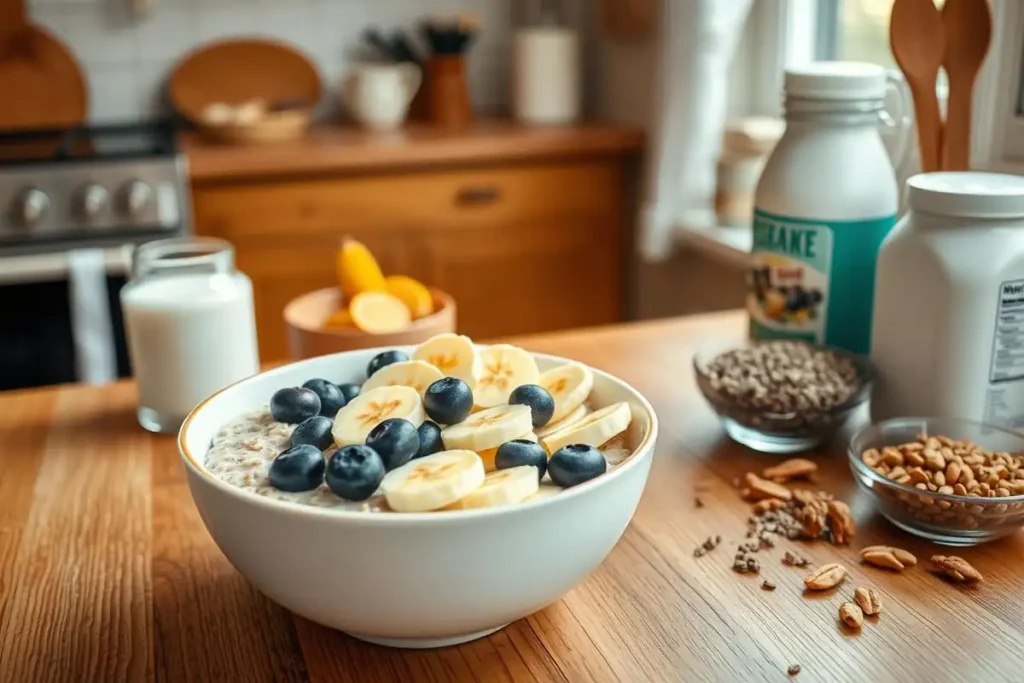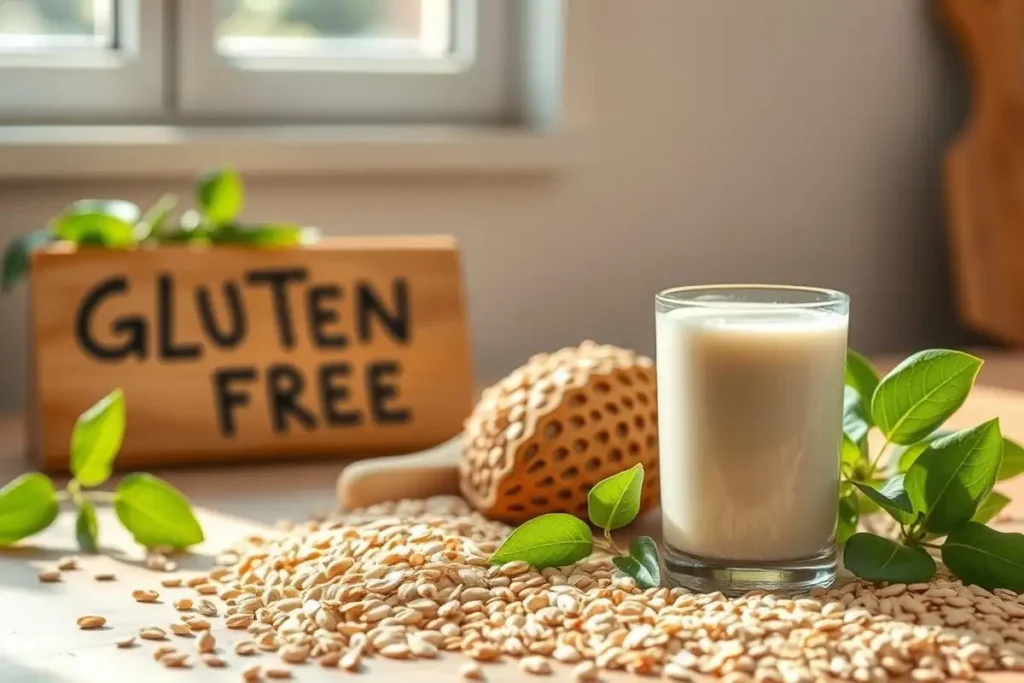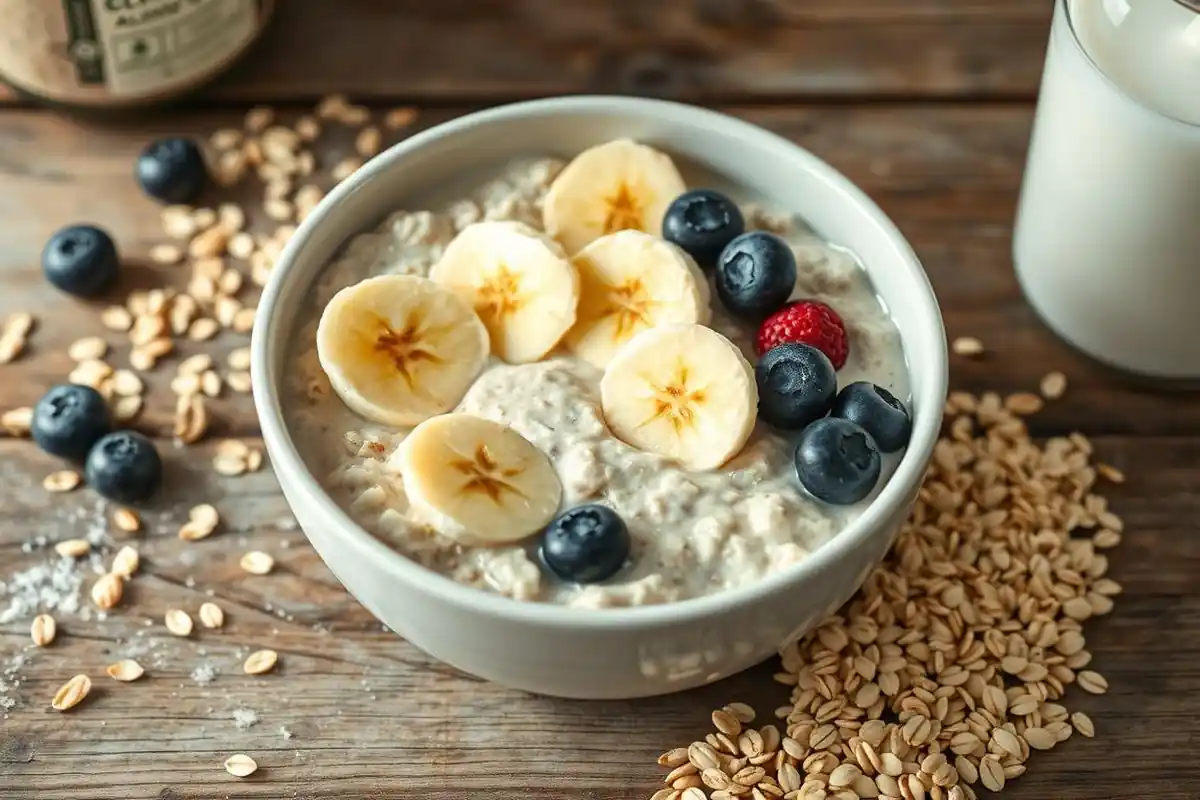Imagine waking up to the smell of warm oats. There’s nothing like a hot bowl of oatmeal on a cold morning. It’s been a favorite for many years. But you may wonder, is oatmeal gluten-free and dairy-free? Many are changing their diets for health, looking for options like a gluten free dairy free breakfast. It’s good to know oatmeal can be a safe and satisfying choice for both diets. You just need to know what to buy.
In this section, we’ll show you how to pick the right oatmeal. So, you can enjoy this tasty food without worry.
Understanding Gluten and Dairy Sensitivities
It’s key to understand gluten and dairy sensitivities if you’re thinking of changing your diet. Many people face negative reactions to these elements. This leads them to cut or remove them from their food. Knowing about gluten and the reasons behind avoiding dairy helps make these diet choices clearer.
What is Gluten?
Gluten is a protein in grains like wheat, barley, and rye. Not everyone has problems with gluten. But, those with celiac disease or gluten sensitivity face various symptoms. About 1% of folks have celiac disease. They need a strict gluten-free diet to dodge serious health issues. Plus, about 13% may have some gluten sensitivity.
Reports say 30% on a gluten-free diet might feel dizzy or nauseous at first. This shows how hard adjusting can be. Yet, knowing about gluten matters a lot. Up to 80% of those with celiac disease don’t even know they have it.
Why Avoid Dairy?
Dairy products have lactose, which is tough on some people’s stomachs. Those with dairy sensitivity get uncomfortable when they have milk products. Choosing a dairy-free diet helps them feel better. It can improve their health, especially when paired with gluten-free choices.
| Condition | Prevalence | Symptoms | Dietary Approach |
|---|---|---|---|
| Celiac Disease | ~1% of the population | Digestive issues, autoimmune responses | Strict gluten-free diet |
| Gluten Sensitivity | ~0.5% – 13% of the population | Varied symptoms including fatigue, bloating | Gluten-free diet |
| Dairy Sensitivity | Varies widely | Gastrointestinal distress | Dairy-free diet |
The Truth About Oats
Oats are often seen as a good option for those avoiding gluten. Pure oats are usually gluten-free and safe for most. Yet, the question is: can oatmeal be both gluten-free and dairy-free? The risk of cross-contamination is a big worry. This is because many oats are processed in places that handle gluten grains. This can cause contamination.
Oats as a Gluten-Free Grain
It’s vital to choose oats that are certified as gluten-free to stay safe. A recent analysis found that 11% of oat products had more gluten than allowed. This is shocking since earlier studies found no gluten in oats. Thus, regular oatmeal might not be safe for those with gluten issues due to high contamination risks during making and packaging.
Potential for Cross-Contamination
It’s important to know about the risks of cross-contamination. Some well-known brands like Quaker and McDonald’s don’t have certified gluten-free oatmeal. This increases the risk for people. Even instant oats need a gluten-free label to be considered safe. The push for gluten-free products has led to safer options like steel-cut oats, but careful selection is still needed.
| Brand | Gluten-Free Status | Comments |
|---|---|---|
| Quaker | Not Gluten-Free | Processed on shared equipment |
| McDonald’s | Not Gluten-Free | Cross-contamination risk |
| Kodiak | Not Gluten-Free | May contain trace gluten |
| Starbucks | Not Certified Gluten-Free | Cross-contamination risk |
| GF Harvest | Certified Gluten-Free | Tested for safety |
| Trader Joe’s | Varies | Recent testing showed unexpected gluten |
Choosing certified gluten-free oats is key to safety for those with dietary limits. Being aware of cross-contamination risks helps too. This knowledge lets you enjoy oatmeal safely, making good food choices for your diet.
Is Oatmeal Gluten-free and Dairy-free?
Are you wondering about oatmeal being gluten-free and dairy-free? You might ask, “Is there gluten in oatmeal?” To find safe oatmeal, it’s important to look at the package.
What to Look for on Labels
Oats are naturally free of gluten. But, they might get mixed with gluten by accident. To be safe, look for a gluten-free mark on the box. Since 2013, food must have under 20 parts per million of gluten to be called gluten-free. This rule helps us trust gluten-free foods more.
If you need oatmeal without gluten or dairy, check the ingredients closely. Some quick oatmeals add dairy, so read labels for gluten and dairy.
Types of Oatmeal
The market has different oatmeals. Here are some you might see:
- Instant Oats: They’re quick to make. Make sure they’re free of gluten and dairy.
- Rolled Oats: These oats are flat and keep a chewy feel. Choose ones with a gluten-free tag.
- Steel-Cut Oats: They’re chopped oats, usually gluten-free. Still, pick trustworthy brands.
To pick the right oatmeal, focus on reading labels. Always go for options that say they have no gluten or dairy. Making smart choices helps you enjoy oatmeal safely.

Are All Oats Naturally Gluten-free?
Oats are indeed gluten-free by nature. But, not all oats are okay for those with gluten issues. We find whole oat groats, steel-cut oats, and rolled oats among oat types. Each one has its own safety and purity concerns.
Main Oat Varieties
Heavily processed oats may face cross-contamination with gluten. This might happen if oats grow near wheat or during their processing. To guide your choices, let’s look into common oat types:
| Oat Variety | Description | Gluten-free Status |
|---|---|---|
| Whole Oat Groats | Minimally processed oats with the outer husk removed. | Can be gluten-free if certified. |
| Steel-Cut Oats | Chopped whole oat groats providing a hearty texture. | Can be gluten-free if certified. |
| Rolled Oats | Steamed and flattened whole oats, often used in oatmeal and granola. | Depends on source; choose certified gluten-free. |
Risks of Contaminated Oats
Oats don’t have gluten or dairy, but contaminated oats exist. In Canada, about 88% of oat samples had gluten from cross-contamination. This is a big worry for people with celiac disease or gluten sensitivities.
In Australia and New Zealand, oats can’t say they are gluten-free due to contamination risks. Even pure oats can bother about 20% of those with celiac disease. But, brands like Oatly and Chobani are safe. They ensure their oats pass strict gluten tests.
Choosing oats means checking their source and certification. Even though oats naturally don’t have gluten, contamination is a real concern. Always look for certified products if gluten is a problem for you.
Understanding Avenin Sensitivity
Avenin sensitivity is a concern for some who eat oats. Avenin is unique to oats, similar to gluten. While many with gluten issues manage oats well, a few react badly. Knowing about avenin is key for those looking to add oats to their meals.
What is Avenin?
Avenin is a protein in oats, like gluten. Oats don’t have gluten but can get it when made. So, some may feel the same symptoms as with gluten. Avenin doesn’t harm the gut like celiac disease. However, it’s important to see how oats affect you. And no, oatmeal doesn’t have dairy. It’s grain-based.
Who is Affected by Avenin?
Some can’t have oats without issues. They include people who are sensitive to similar proteins. They might feel upset stomachs or worse. If you think you’re sensitive, be careful with oats. Talk to a doctor if you’ve had gluten problems before. Here’s a quick look at avenin sensitivity:
| Characteristic | Description |
|---|---|
| Protein Type | Avenin, similar to gluten |
| General Tolerance | Most with gluten sensitivity tolerate oats |
| Symptoms | Digestive discomfort, allergic reactions |
| Health Advice | Consult healthcare provider before consuming oats |
| Cross-Reactivity | Possible with individuals allergic to gluten |
Oat Milk: Is it Gluten-free and Dairy-free?
Oat milk is now a favored option for those avoiding dairy and gluten. It’s creamy and can enhance your meals. Yet, it’s vital to know if it’s truly gluten-free. You can make gluten-free oat milk at home with the right oats. But, store-bought versions might not always be safe due to cross-contamination. Always check labels to find oat milk gluten-free options.
Preparing Oat Milk at Home
It’s easy to make oat milk yourself and control what goes into it. Here’s a simple recipe:
- 1 cup certified gluten-free oats
- 4 cups water
- Optional: sweetener or vanilla extract to taste
Just blend the oats and water until smooth. Then, strain it to keep the liquid and remove the pulp. This way, you get oat milk that’s not only gluten-free but also full of fiber and nutrients.
Store-Bought Options
For store-bought oat milk, look for gluten-free oat milk labels. Brands like Oatly and Planet Oat are reliable. It’s key to check for gluten-free certifications. Even small amounts of gluten can be harmful to those sensitive. Pick brands ensuring gluten below 20 ppm.

Store-bought oat milk is nutritious too. A cup has about 130 calories, 4 grams of protein, plus B vitamins and calcium. It’s creamy and good for many diets. Yes, it has more carbs than almond or soy milk. But, it’s a tasty and healthy choice if you’re avoiding dairy.
Health Benefits of Including Oats
Adding oats to your diet is good for your health, especially if you need gluten-free food. Oats have lots of nutrients that make them great for anyone caring about their health. They help a lot in keeping you healthy.
Nutritional Profile of Oats
Oats are full of important nutrients that keep you healthy. A half-cup of dry oats has lots of vitamins and minerals:
| Nutrient | Amount per 0.5 cup (dry) | Daily Value (DV) Percentage |
|---|---|---|
| Manganese | 63.9% of DV | 63.9% |
| Phosphorus | 13.3% of DV | 13.3% |
| Magnesium | 13.3% of DV | 13.3% |
| Copper | 17.6% of DV | 17.6% |
| Iron | 9.4% of DV | 9.4% |
| Zinc | 13.4% of DV | 13.4% |
| Folate | 3.2% of DV | 3.2% |
| Vitamin B1 (Thiamin) | 15.5% of DV | 15.5% |
| Vitamin B5 (Pantothenic Acid) | 9.1% of DV | 9.1% |
Benefits for a Gluten-Free Diet
ItNavigating a gluten-free and dairy-free diet can be challenging, making it essential to find versatile and nutritious options. Is oatmeal gluten-free and dairy-free? The good news is that pure, uncontaminated oats are naturally both gluten-free and dairy-free, making them a great choice for those with dietary restrictions. Eating oats, when prepared carefully, offers numerous health benefits, including promoting heart health, aiding in weight management, and helping to regulate blood sugar. They are also an excellent source of dietary fiber, which is beneficial for digestion and can alleviate constipation.
Here’s a more detailed look at the advantages:
- Improved Heart Health: Oatmeal can contribute to lower LDL cholesterol levels.
- Weight Management: The fiber in oats promotes feelings of fullness, aiding in weight management.
- Blood Sugar Regulation: Oats can help regulate blood sugar levels and improve insulin sensitivity.
- Digestive Health: The high fiber content supports digestive function and can be helpful for those who experience constipation.
Research suggests that pure oats are generally well-tolerated by individuals with celiac disease, though, as always, individual sensitivities can vary. If you’re asking, “Is oatmeal gluten-free and dairy-free,” the answer, when you choose the right products, is a definite yes, making it an excellent addition to your health-conscious eating plan..
Choosing the Right Oats and Oat Products
While oats themselves are naturally gluten-free and dairy-free, contamination during processing is a significant concern. In fact, around 30% of oat products may have some level of gluten contamination. Therefore, being vigilant when selecting oat products is paramount, especially for those who are strictly gluten-free or dairy-free. A key factor to look for is a clear “gluten-free” certification on the packaging. This indicates that the product has undergone testing and meets the standards for being gluten-free. For individuals with celiac disease, this certification is essential.
What to Look for when Shopping
Before making a purchase, keep the following factors in mind:
- Certifications: Prioritize products that are labeled as “gluten-free.” Reputable brands like Bob’s Red Mill and Quaker utilize rigorous testing to guarantee their products contain less than 20 parts per million (ppm) of gluten, meeting FDA standards.
- Packaging: Opt for airtight containers to keep your oats fresh, particularly if you live in a humid climate.
- Type of Oats: Choosing minimally processed oats, such as steel-cut oats, is beneficial. These varieties offer more nutritional value and a lower glycemic index.
- Ingredient List: Carefully review the ingredient list to ensure there are no gluten-containing additives or fillers.
- Cross-Contamination: Choose brands that actively take measures to minimize the risk of cross-contamination during production.
Top Brands that Offer Gluten-Free Oats
Some brands are known for their gluten-free oats. You should consider these:
| Brand | Certification Type | Product Highlights |
|---|---|---|
| Bob’s Red Mill | Certified Gluten-Free | Known for a wide range of gluten-free oat products with great quality and taste. |
| Quaker | Gluten-Free Label | They offer tasty choices like quick oats and rolled oats that are safe to eat. |
| Glutenfreeda | Certified Gluten-Free | Focuses on gluten-free oatmeal products, paying close attention to the quality of ingredients. |
By following these guidelines and picking one of the top gluten-free oat brands, you can have nutritious oats in your diet. And you won’t have to worry about gluten.
Conclusion
Oatmeal can be gluten-free and dairy-free if you choose the right products. It’s key to know about cross-contamination risks. If you have sensitivities, learn about avenin. This helps in choosing the best gluten-free oatmeal for your diet.
Oatmeal adds great nutrition to your diet when chosen carefully. Adults with celiac disease can have 70 grams of pure oats daily. Kids can have up to 25 grams. Even with some risks, pure oats are mostly safe for those with gluten issues.
Go for high-quality, certified gluten-free oats. This lets you enjoy this healthy grain every day. Make sure to pick products that fit your gluten-free and dairy-free needs. This way, you can enjoy all the benefits oats have to offer.

